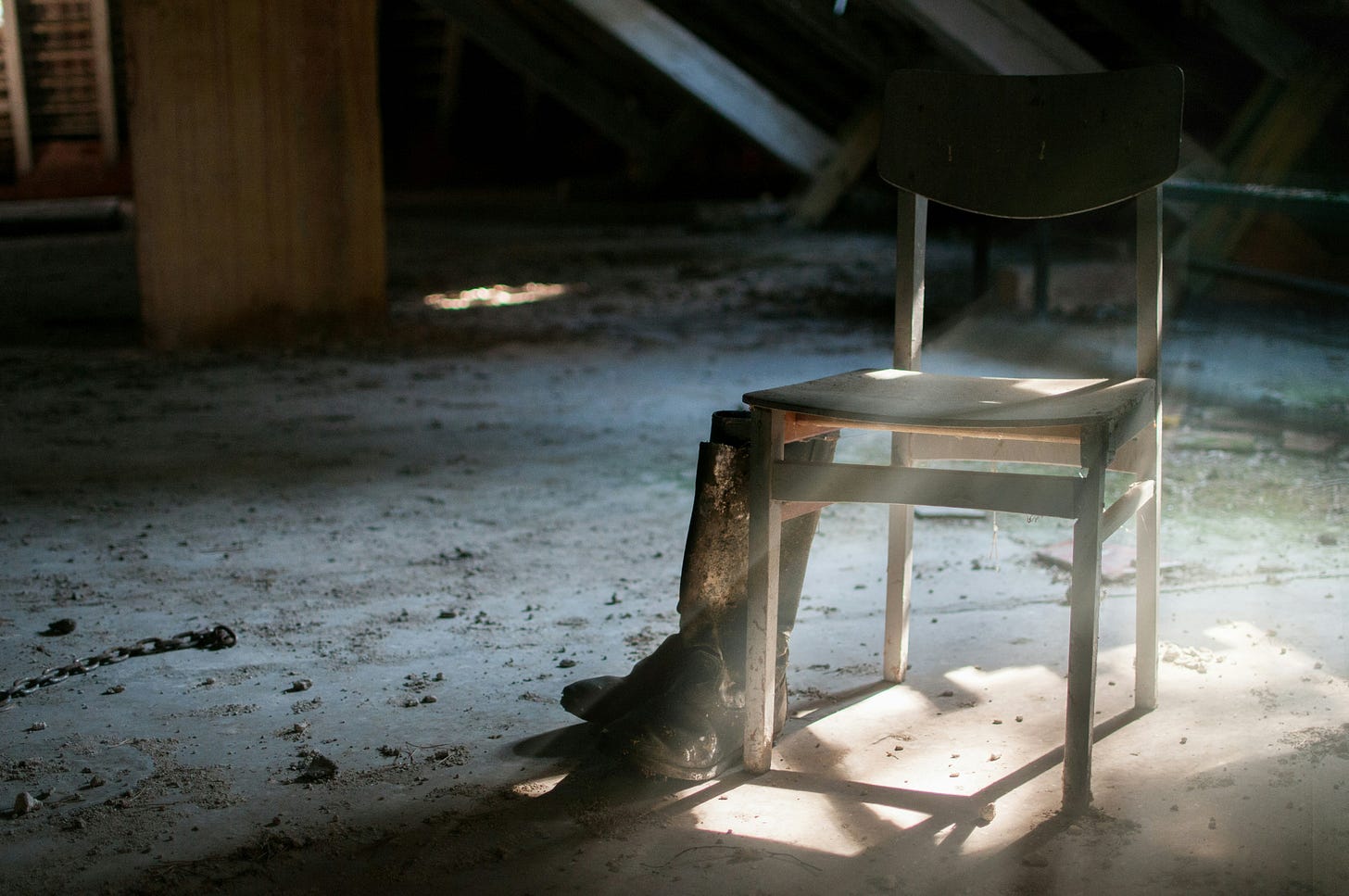OverFlow: Sitting With Myself
Maybe I think that I'm not in the worst-case scenario. Maybe I will loosen my hold on the weight of everything in me and allow myself to float up into happiness I've never felt.
OverFlow is what happens when I overthink, overflow, and over-everything. When my feelings have nowhere to go, I write about them.
There is a chair in our apartment that has been broken and replaced twice. It's at the head of the dinner table—it would have been the seat my father would have sat in if he had lived long enough to visit us here. This could be another letter about grieving my dad, but that would be a diversion from dealing with the truth.
The Ghost of the Father I Didn't Know
Why does that chair keep breaking? It's because of me. When I get furious and feel like I'm being ignored, my brain tells me to be violent—but not too much—so I destroy that chair, which is the one I usually sit in. I pick it up, hold it high above my head, and throw it across the floor. I do that again and again until it breaks. It's embarrassing to admit that I've done this more than once, but it'll probably happen again if I don't process how I feel about it. I don't want to buy another chair from IKEA.
My mother and her whole side of the family would probably not be surprised to hear about this because I had "temper tantrums" when I was a kid. They would blame my father and tell me that I inherited this type of anger from him. But did I really? Because as much as they love talking about my dad's anger issues, I've only seen him be violent once in my life. It could be that that side of my father was more prominent before I was born. But it could also be that my mother's side of the family isn't used to displaying and showing emotions—so my father's anger was deemed "too much" and "violent" compared to theirs.
The Mother Who Shaped My Inner Child
It was my mother's anger that I knew all too well growing up. It shaped who I am today in ways that I am just recognizing as someone in her 40s. She was never violent, loud, or outright mad—but also, never really joyful.
When something bothered my mom, she would keep her feelings to herself. But it would come out in how she talked and looked at you. "Kumain ka na ba?" is usually a way to say "I love you" in Tagalog without actually saying the words. But when my mom was mad, it would sound like the iciest, meanest jab at my heart. When she would clean the house, a gut feeling would force me to be the quietest little mouse and hide in a corner until she was done. Unlike other Filipino moms, she never forced me to do chores with her, but I would feel her angry energy as she did them around me. It wasn't until I was an adult that I realized that during these moments, she was furious because I didn't offer to help, and she didn't want to have to ask.
Otherwise, my mother was—and probably still is—patient and forgiving. I hesitate to say loving because although I know she is, she shows it in a way that doesn't often connect with who I am on the inside. Truly, a laugh! Because how I work on the inside is all because of me learning how she works.
I get mad like my mom gets mad. I would venture to say that I'm always mad inside because I forgive, but I don't forget. I can't let go of information that could possibly help me survive a worst-case scenario future. And that information builds up inside me and weighs me down just a little more each day.
I am so much like my mother that I wonder if she's okay or just pretending. I wonder if when I became the quietest little mouse, I was actually mirroring her inner child. Is she still floating, or is she pinned down by the weight and drowning? Am I still floating, or am I pinned down by the weight and drowning? Am I still the mouse? Am I okay or just pretending?
Am I picking myself back up just to throw myself away again and again until I break?
Sitting With Myself
I have built and rebuilt myself many times in the past, often when I couldn't really afford or justify the hassle of changing. But realizing I got angry like my mom after years of being told I had my dad's temper rewired my insides so much that there was no other way to level up and improve my life without the hassle of changing. Is my violence a way to disconnect? Do I even like it? Why does it keep happening? So here we go again.
I have a brand new chair at the dinner table, and maybe I’m my mother and not my father. Maybe it's okay that Raf built that chair instead of me. Maybe I'm okay if I'm not pretending. Maybe I think that I'm not in the worst-case scenario. Maybe I will loosen my hold on the weight of everything in me and allow myself to float up into happiness I've never felt. Maybe my mother never modeled joyfulness to me, but that doesn't mean I can't feel it.
Photo by Nathan Wright on Unsplash
If you’ve enjoyed reading this or something else I’ve written, please consider buying me a coffee. ☕ Thank you!





it’s a tender reflection on how unspoken anger can shape a child’s inner world, and how we only begin to understand it years later, through distance and age. the part about hiding like a little mouse. this is so beautiful☹️
This piece pulses with emotional honesty and quiet revelations. What struck me most was how you wove memory and introspection into something as deceptively ordinary as a chair, transforming it into a symbol of generational emotion, survival, and identity. Your exploration of anger—both inherited and absorbed—carries a rare clarity, refusing easy blame and instead inviting complexity. It’s powerful the way you sit with the discomfort rather than trying to resolve it quickly. The closing paragraph, especially, offers a gentle, earned hope that doesn't deny the weight of what came before.